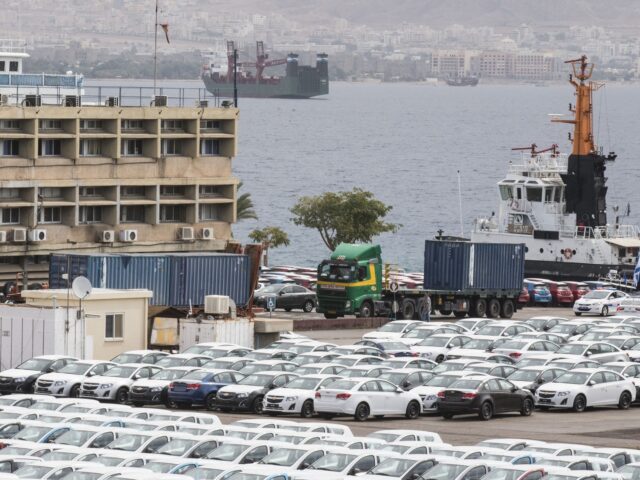The “Islamic Resistance in Iraq,” an association of Iran-affiliated jihadist entities in the country, claimed responsibility on Monday for a reported drone strike on Eilat, Israel, that hit a naval building.
Israel Defense Forces (IDF) authorities confirmed “slight damage” to the building, according to the Times of Israel, but the strike resulted in no injuries or any significant harm. The IDF claimed the drone appeared to fly in from the east, aligning with claims by the “Islamic Resistance in Iraq.”
The attack did not result in any meaningful damage but does signal an interest on the part of the “Islamic Resistance in Iraq” to elevate its profile as one of several terrorist entities seeking to support the Sunni jihadist terror organization Hamas following its genocidal siege of Israel on October 7, 2023. On that day, the terrorists killed 1,200 civilians, many of them in their own homes, and engaged in acts of gang rape, infanticide, the desecration of corpses, and other atrocities. In response, regional terrorist organizations – including Shiite entities such as the Lebanese Hezbollah and the Houthi terrorists of Yemen – have launched further terrorist campaigns against Israel, American forces in the region, and other Western targets.
The Islamic Resistance in Iraq took credit for a drone attack on American soldiers on the Syrian-Jordanian border, killing three service members in January.
“The fighters of the Islamic Resistance in Iraq targeted a vital target in our occupied territories on Monday morning, using appropriate weapons,” the group said in a statement on Monday, according to the Iranian propaganda outlet PressTV. The attack, it claimed, was “in support of our people in Gaza, and in response to the massacres committed by the usurping entity against civilian Palestinians, including children, women and the elderly.”
The Hamas terrorist organization is headquartered in and controls the Gaza Strip; after October 7, the IDF launched self-defense operations against Hamas targets in the area, which the terrorists claim are “massacres” of civilians rather than precision operations against known terrorists. Terrorist allies of Hamas have openly celebrated the atrocities of October 7 while accusing Israel of “genocide.”
PressTV noted that the “Islamic Resistance in Iraq” did not specify what kind of attack it engaged in against Israel or what it targeted.
The Times of Israel, citing the IDF, confirmed a drone “apparently launched from Iraq” hit the city of Eilat, a port hub on the southern tip of Israel giving the country access to the Red Sea. A building that forms part of a naval base in the city suffered minor damage; it is unclear if the drone was deliberately attempting to hit the Israeli Navy or was simply attempting to do damage to the port.
🇱 — VID UPDATE: IDF says a drone attack in Eilat lightly damages building, no injuries. Earlier reports said a naval base was hit. Iran backed Islamic Resistance terror gorup of Iraq takes responsibility. pic.twitter.com/8un4SxBXDB
— Belaaz News (@TheBelaaz) April 1, 2024
Given its location on the Red Sea, Eilat has experienced some of the most harm from jihadist terrorist attempts to disrupt daily life in Israel. The drone strike on Monday was not the first time the Islamic Resistance in Iraq claimed responsibility for an attack on the city. In January, the terrorists issued a statement claiming that it was behind a similar drone invasion of the port city. On that occasion, however, the IDF announced it had identified an invading drone and intercepted it before it managed to conduct any strikes.
“The target was under IDF surveillance and did not penetrate into Israeli territory,” the military confirmed.
A month later, the Iran-backed Houthi terrorists of Yemen claimed a reported attempted missile attack on Eilat. Israeli officials announced that the Arrow missile defense system intercepted an incoming “launch,” resulting in no damage to the targeted city.
“Israel did not identify what the fire was, nor where it came from. However, the Arrow system intercepts long-range ballistic missiles with a warhead designed to destroy targets while they are in space,” the Associated Press reported at the time.
Eilat is also suffering some of the worst consequences of the Houthis’ campaign to disrupt global commercial shipping by bombing random ships traveling to and from the Red Sea. Houthi leaders announced in October that they would begin to strike ships allegedly engaging in commerce with Israel, later expanding their targets to alleged American and British ships in response to those countries conducting airstrikes in Yemen intended to limit Houthi strike capabilities. In reality, however, the Houthis have attacked ships from all over the world, including ships with connections to rogue states allied with the Houthis including Iran, Russia, and China.
In an interview in March, Gideon Golber, the CEO of Eilat Port, told the Media Line news outlet that ship traffic at the port had fallen to zero following the Houthi attacks.
“Every month, we had between 12 and 13 ships coming and going, and now we have 0,” he lamented. “In November, we had 50,000 cars stored in the port; now we have only 10,000. The car importers are taking the cars every day but no cars are coming through Eilat anymore.”
Reports in late March indicated that the port was looking into laying off as much as half its staff in response to the abrupt halt in shipping traffic, in turn prompting organized labor action.
Follow Frances Martel on Facebook and Twitter.

COMMENTS
Please let us know if you're having issues with commenting.